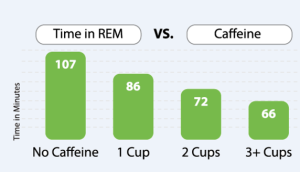For many people in this country and across the world, caffeine plays a significant role in everyday life and is used for many reasons. I know many college students including myself use caffeine in order to get through the school day without falling asleep, or to stay awake in order to do school work late at night. While it can be very convenient and helpful to use when needed, there are negative effects of too much caffeine. Too much might lead to health issues regarding blood pressure, sleep, and the heart.
Although it isn’t quite clear how, caffeine does affect blood pressure, but it affects certain people more depending on many variables. The amount and how often one drinks caffeine is a huge factor. For example, people who drink caffeine all the time are going to have a higher blood pressure than people who drink a minimal amount. This is especially the case in heavyset men that are over the age of 70 (Sheps). Drinking caffeine is also riskier for people that naturally have higher blood pressure than normal. To minimize these risks, these people can go to a doctor and get input from a professional about how much caffeine they should drink on a daily basis. The result will probably be to try and limit the daily intake and see
how it goes (Sheps).
Abusing caffeine in the wrong ways will lead to negative effects in sleep patterns. “They consist principally of prolonged sleep latency, shorter total sleep time, increases in light sleep and shortening of deep sleep time, as well as more frequent awakenings (coffee&health).” Based on the amount of caffeine a person drinks throughout the day, these effects differentiate between each person. Tests were conducted to see how caffeine affects young adults compared to middle-aged adults. These tests showed that caffeine affected both groups in a very similar way  (coffee&health). To really diminish these effects on sleep patterns people should stop drinking caffeine completely if possible, otherwise they should drink a minimal amount per day.
(coffee&health). To really diminish these effects on sleep patterns people should stop drinking caffeine completely if possible, otherwise they should drink a minimal amount per day.
The effects of caffeine in the heart are somewhat unclear still, but are
being studied in depth. Some experts believe that caffeine in moderation is not a huge deal to the health of the consumer, but can cause withdrawal symptoms (American Heart Association). Over the course of an extended period of time, a study taking place in Spain concluded that as long as caffeine intake is no more than 400 mg on a daily basis, there will be no increase in the risk of coronary heart disease (Food Insight). This conclusion allows consumers to be able to drink some caffeine without worrying about heart problems.
While caffeine helps people become productive and get tasks done, I believe that the negative effects relating to blood pressure and sleep patterns outweigh the positives. Being a college student, I have used caffeine to help me get through certain days. With this being said, it has definitely made me feel even more run down after not sleeping well. It might seem cliche, but I do believe that the saying “everything is good in moderation” applies well to caffeine.

This is a really interesting post for me, because i am very fascinated with the whole coffee addiction; mostly because i can’t drink the stuff, my sweet tooth wont let me. Many people i know have a lot of cups of coffee per day due to the energy boost it gives them. I like the way you discussed the pro’s and cons, then highlighted that everything done in moderation is ok and that relates back to many things in life.